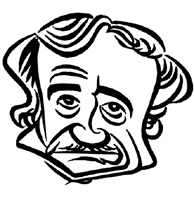LITR 5535: American
Romanticism

Student Poetry Presentation 2006
Monday 2 October:
poetry: Poe, "Anabelle Lee," N 2671
poetry reader / discussion leader: Corey Porter
Edgar Allan Poe, “Annabel Lee”

Poe (1809-1849), a legendary poet, author and critic, met the majority of his acclaim posthumously. He walked the line between critical and financial success for the entirety of his career, often finding one without the other. Poe was a poet and author, but made his living as a critic. His scathing criticisms of literary contemporaries sold magazines, but in the end left him unemployed. Poe is most often credited with creating the detective story and refining the psychological thriller.
Poe’s “Annabel Lee” seems to be a cathartic response to the grief of losing his child-bride and cousin, Virginia Clemm, whom he secretly married at the age of thirteen (Poe was twenty-six). Its six stanzas run the gamut from light to dark, encompassing what we today consider “Gothic.”
Annabel Lee (1849)
It was many and many a year ago,
In a kingdom by the sea
That a maiden there lived whom you may know.
By the name of ANNABEL LEE;
And this maiden she lived with no other thought
Than to love and be loved by me.
I was a child
and she was a child,
In this kingdom by the sea;
But we loved with a love that was more than love—
I and my ANNABEL LEE —
With a love that the wingèd seraphs of heaven
Coveted her and me.
And this was the reason that, long ago,
In this kingdom by the sea,
A wind blew out of a cloud, chilling
My beautiful ANNABEL LEE;
So that her highborn kinsman came
And bore her away from me,
To shut her up in a sepulchre
In this kingdom by the sea.
The angels, not half so happy in heaven,
Went envying her and me—
Yes!—that was the reason (as all men know,
In this kingdom by the sea)
That the wind came out of a cloud by night
Chilling and killing my ANNABEL LEE.
But our love it was stronger by far than the love
Of those who were older than we—
Of many far wiser than we—
And neither the angels in heaven above,
Nor the demons down under the sea,
Can ever dissever my soul from the soul
Of the beautiful ANNABEL LEE:
For the moon never beams, without bringing me dreams
Of the beautiful ANNABEL LEE;
And the stars never rise, but I feel the bright eyes
Of the beautiful ANNABEL LEE;
And so, all the night tide, I lie down by the side
Of my darling—my darling—my life and my bride,
In her sepulchre there by the sea—
In her tomb by the sounding sea.
Objective 1a.
“To identify and criticize ideas and attitudes associated with Romanticism, such as desire and loss…”
1) “Annabel Lee” obviously has a tremendous amount of loss within it. In what ways, if any, does Poe express desire?
Objective 1c.
“the gothic novel or style
(haunted physical and mental spaces, the shadow of death or decay; dark and
light in physical and moral terms; film noir)”
2) The sepulchre is a physical symbol of death and decay, but can it also represent light in either physical or moral terms? What other symbols of light does Poe use?
Objective 2.
“American Romanticism exposes competing
or complementary dimensions of the American identity: is America a culture
of sensory and material gratification or moral, spiritual, idealistic
mission?”
3) Is Poe’s “Annabel Lee” an expression of a moral or physical mission?
|
|
|
|

